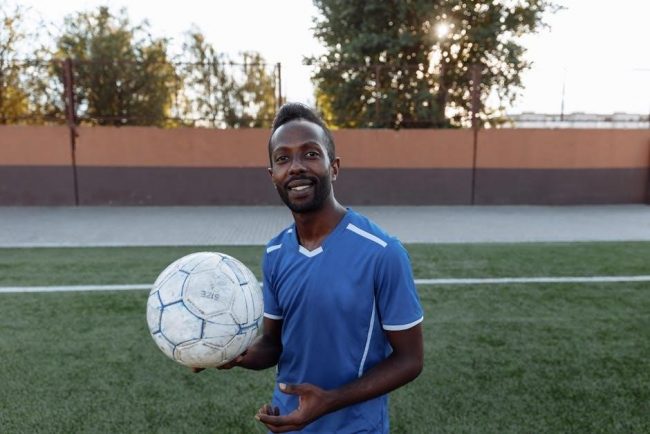Off-season soccer training is a critical period for players to enhance strength, speed, agility, and technical skills while reducing injury risks and maintaining fitness levels for the upcoming season.
Importance of Off-Season Training for Soccer Players
In off-season soccer training, players focus on building strength, improving speed, and enhancing soccer-specific skills. This period is crucial for reducing injury risks and maintaining fitness levels. It allows athletes to recover and prepare for the upcoming season without the pressures of competition. A well-structured program ensures players return in peak condition, ready to perform at their best.
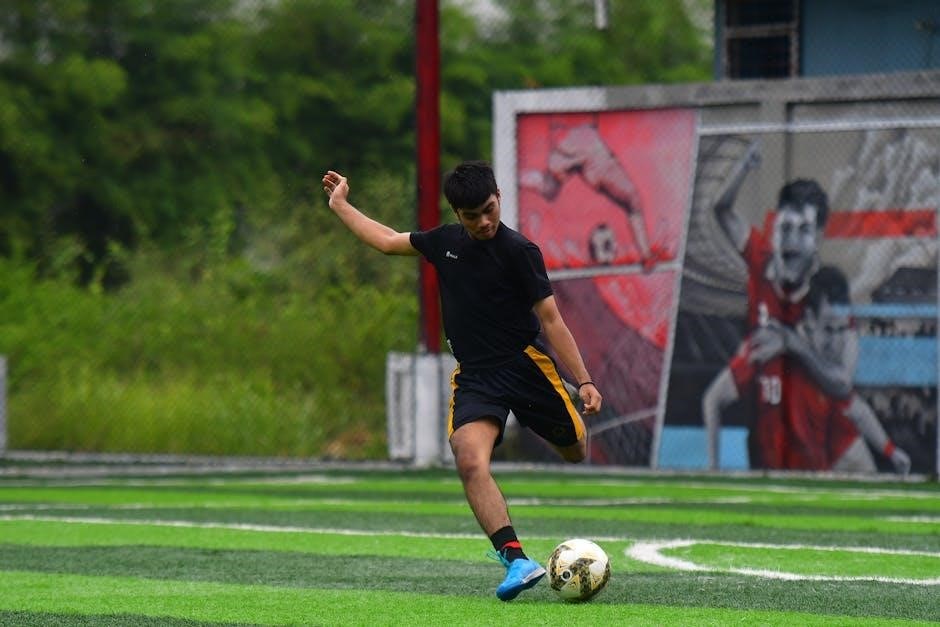
Goals and Objectives of an Off-Season Soccer Training Program
The goals are to build strength, improve speed, agility, and endurance, while enhancing soccer-specific skills and preventing injuries, ensuring players are fully prepared for the upcoming season.
Building Strength and Power
Strength and power are foundational for soccer performance. Focus on exercises like squats, deadlifts, and lunges to build lower body strength. Include upper body workouts such as bench presses and pull-ups to enhance overall muscle development. Incorporate plyometric drills like box jumps and burpees to improve explosive power. Aim for 3-4 strength training sessions per week, progressing weights and reps to avoid plateaus. This phase ensures players develop the muscular endurance and explosiveness needed for the season.
Improving Speed, Agility, and Endurance
Speed, agility, and endurance are vital for soccer performance. Incorporate sprinting drills, ladder exercises, and cone agility workouts to enhance quick movements and sharp changes of direction. Endurance can be built through long runs, interval training, and high-intensity drills. These exercises improve cardiovascular fitness and stamina, allowing players to maintain peak performance throughout matches. Aim for 2-3 sessions per week, combining these elements to ensure well-rounded physical preparation for the season ahead.
Enhancing Soccer-Specific Skills
Off-season training is an ideal time to refine soccer-specific skills such as ball control, shooting, passing, and dribbling. Focus on drills like close control exercises, first touch practices, and small-sided games to simulate match scenarios. Incorporate finishing drills and volleys to improve accuracy and power. Consistent practice of these techniques enhances precision and composure, preparing players for in-game situations and elevating their performance for the upcoming season.
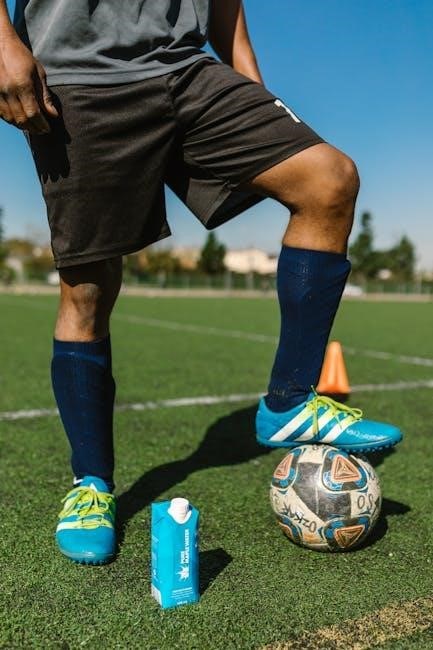
Structure and Duration of an Off-Season Training Program
Off-season soccer training typically lasts 4-6 weeks, with structured programs like a 6-week plan focusing on building strength, agility, and soccer-specific skills each week.
Phases of Off-Season Training
Off-season training is divided into strategic phases, starting with foundational strength and conditioning, followed by power development, and ending with sport-specific skill refinement. Each phase lasts 1-2 weeks, ensuring progressive overload and adaptation. The first phase focuses on building a strength base, the second on explosive power, and the final phase on applying these gains to soccer-specific movements. This structured approach ensures players peak physically and technically for the new season.
Sample 6-Week and 6-Month Workout Plans
A 6-week program focuses on building strength, agility, and endurance through functional training, ball work, and conditioning. It includes daily workouts like leg strengthening exercises, dribbling drills, and recovery sessions. The 6-month plan is tailored for high school and collegiate players, with phases targeting strength, power, and sport-specific skills. Both plans emphasize progressive overload and adaptation, ensuring players are fully prepared for the upcoming season with a balanced approach to fitness and technical development.
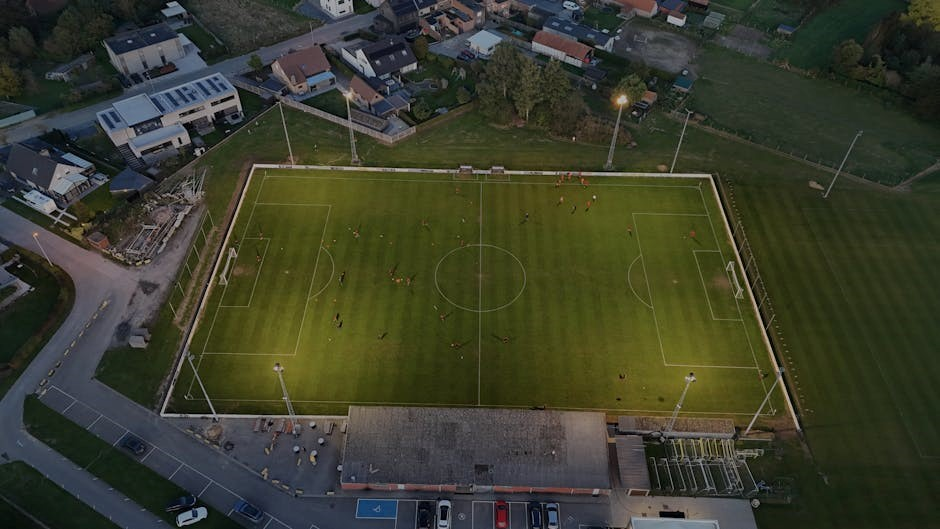
Key Components of an Off-Season Soccer Training Program
Essential elements include strength training, speed/agility drills, cardiovascular workouts, and soccer-specific skill development, ensuring a comprehensive and balanced approach to optimizing player performance and preparation for the season.
Strength Training Exercises
Strength training focuses on compound lifts like deadlifts, squats, and bench presses to build muscle and power. Players also perform plyometrics and functional exercises to improve explosiveness and stability, ensuring they return stronger and more resilient for the season.
Speed and Agility Drills
Focus on speed and agility through drills like sprinting, ladder exercises, and cone setups. These improve acceleration, quick changes of direction, and responsiveness. Box jumps and shuttle runs enhance explosiveness and reaction time. Proper technique reduces injury risk while optimizing performance. This comprehensive approach ensures players gain the edge needed for the upcoming season.
Cardiovascular and Endurance Workouts
Cardiovascular and endurance workouts are essential for improving stamina and longevity on the field. Incorporate long runs, interval training, and high-intensity sprints to boost heart health and sustain energy levels. These exercises enhance aerobic capacity, enabling players to perform at peak levels throughout the game. Consistent endurance training also reduces fatigue and injury risks, ensuring players are physically prepared for the demands of the upcoming season.
Soccer-Specific Skills Development
Soccer-specific skills development focuses on refining techniques like ball control, dribbling, passing, and shooting. Off-season training emphasizes functional drills to enhance precision and decision-making. Players practice game-like scenarios, improving reaction time and tactical awareness. Incorporating small-sided games and positional drills helps tailor workouts to individual roles, ensuring players return to the season with polished skills and a competitive edge.
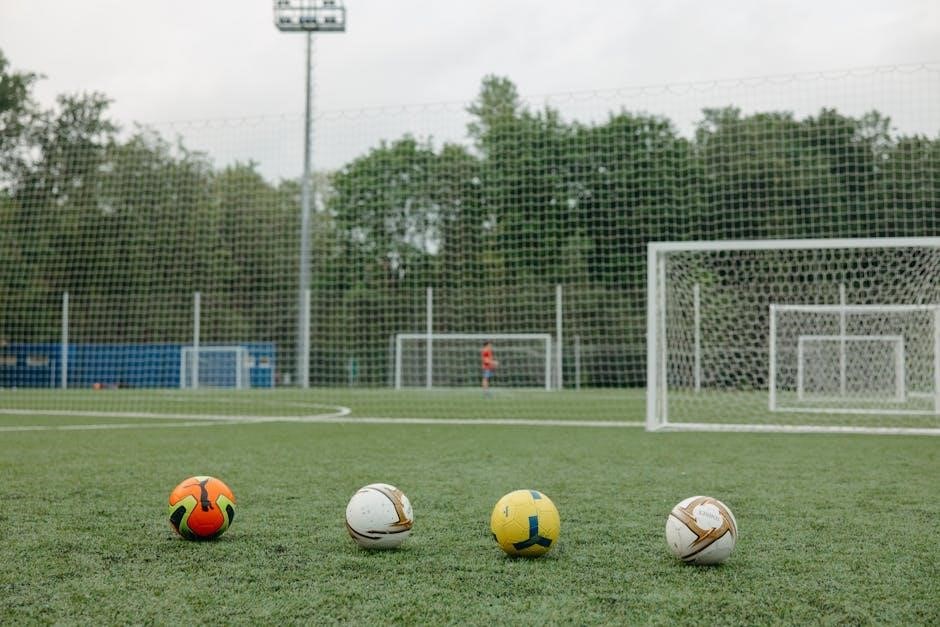
Sample Workout Programs for Off-Season Training
Structured programs include 3-day and 2-day per week weight training plans, focusing on strength and endurance. A 6-week program offers functional training and conditioning sessions, while a 6-month plan provides progressive development for optimal preparation.
3-Day Per Week Weight Training Program
A 3-day per week weight training program focuses on building strength and power. It includes exercises like deadlifts, bench presses, and pull-ups, targeting different muscle groups. Day 1 might focus on lower body strength, Day 2 on upper body, and Day 3 on explosive power. Auxiliary exercises improve flexibility and endurance. This structured approach ensures progressive overload, enhancing overall performance and reducing injury risks during the soccer season.
2-Day Per Week Weight Training Program
A 2-day per week weight training program is ideal for players with limited time. It focuses on full-body workouts, combining strength and power exercises like bench presses, pull-ups, and deadlifts. Each session targets major muscle groups to improve overall strength and endurance. This program is designed to maintain fitness levels during the off-season while allowing for recovery and other training activities, ensuring players stay prepared for the upcoming soccer season.
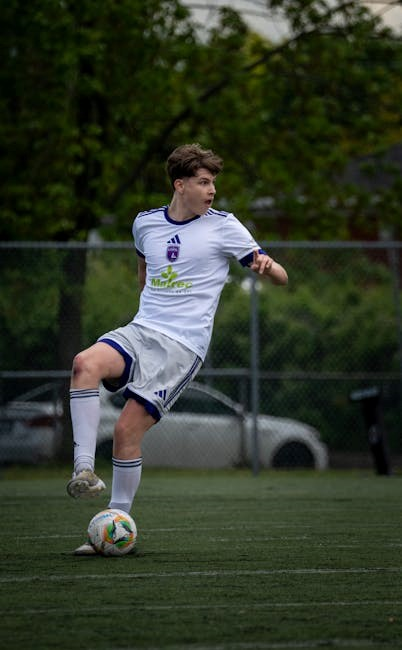
Nutrition and Recovery Strategies
Proper nutrition and recovery are vital for optimizing performance and preventing injuries. Focus on balanced meals, hydration, and adequate sleep to support muscle repair and energy replenishment.
Healthy Eating Guidelines
A well-balanced diet is essential for optimal performance and recovery. Focus on lean proteins, complex carbs, and healthy fats to fuel workouts and repair muscles. Hydration is key, with water and electrolyte-rich drinks recommended. Avoid processed foods and fast food to maintain energy levels and overall health. Meal timing should align with training sessions, ensuring proper nutrition before, during, and after workouts for maximum efficiency and recovery.
Recovery Techniques for Optimal Performance
Proper recovery is vital for maximizing performance and preventing injuries. Incorporate stretching, foam rolling, and hydration to aid muscle repair and flexibility. Prioritize 7-9 hours of sleep daily to support physical and mental rejuvenation. Active recovery, such as light jogging or swimming, enhances blood flow without overexertion. These practices ensure players return stronger and more prepared for the demands of the upcoming season.
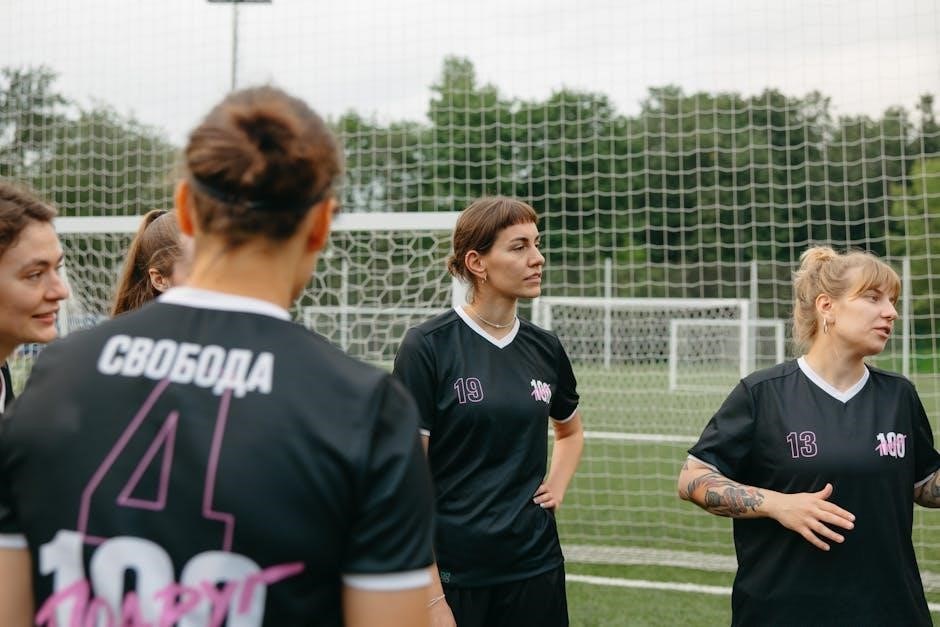
Mental Preparation and Conditioning
Mental preparation is crucial during the off-season, focusing on mindset development and incorporating exercises like visualization and mindfulness to enhance performance and build mental resilience for the upcoming season.
Mindset Development for the Upcoming Season
Mindset development is vital during the off-season, focusing on building mental resilience, confidence, and focus. Players should practice visualization techniques, set clear goals, and maintain a positive attitude. Incorporating mindfulness exercises helps manage stress and stay motivated. A strong mindset ensures players return mentally prepared, ready to adapt to challenges and perform at their best during the season.
Incorporating Mental Exercises into Training
Mental exercises, such as visualization and mindfulness, should be integrated into off-season training to enhance focus and decision-making. Players can practice visualization techniques to rehearse game scenarios, improving reaction time and confidence. Additionally, mindfulness practices help reduce stress and maintain concentration, ensuring a mentally sharp performance when the season begins. These exercises complement physical training, fostering a holistic approach to player development.
A well-structured off-season soccer training program enhances strength, speed, and skills while reducing injury risks. Consistency and mental focus are key to achieving peak performance for the next season.
Final Tips for a Successful Off-Season Training Program
- Stay consistent with workouts and nutrition plans to maximize progress.
- Balance strength, speed, agility, and skill development for a well-rounded approach.
- Gradually increase intensity to avoid injuries and prevent burnout.
- Focus on recovery techniques, such as stretching and hydration, to optimize performance.
- Set clear goals and track progress to maintain motivation throughout the off-season.
- Incorporate mental exercises to build confidence and prepare for the upcoming season.
- Seek professional guidance to tailor programs to individual needs and goals.
By following these tips, players can ensure a productive and successful off-season, setting themselves up for peak performance when the season begins.
